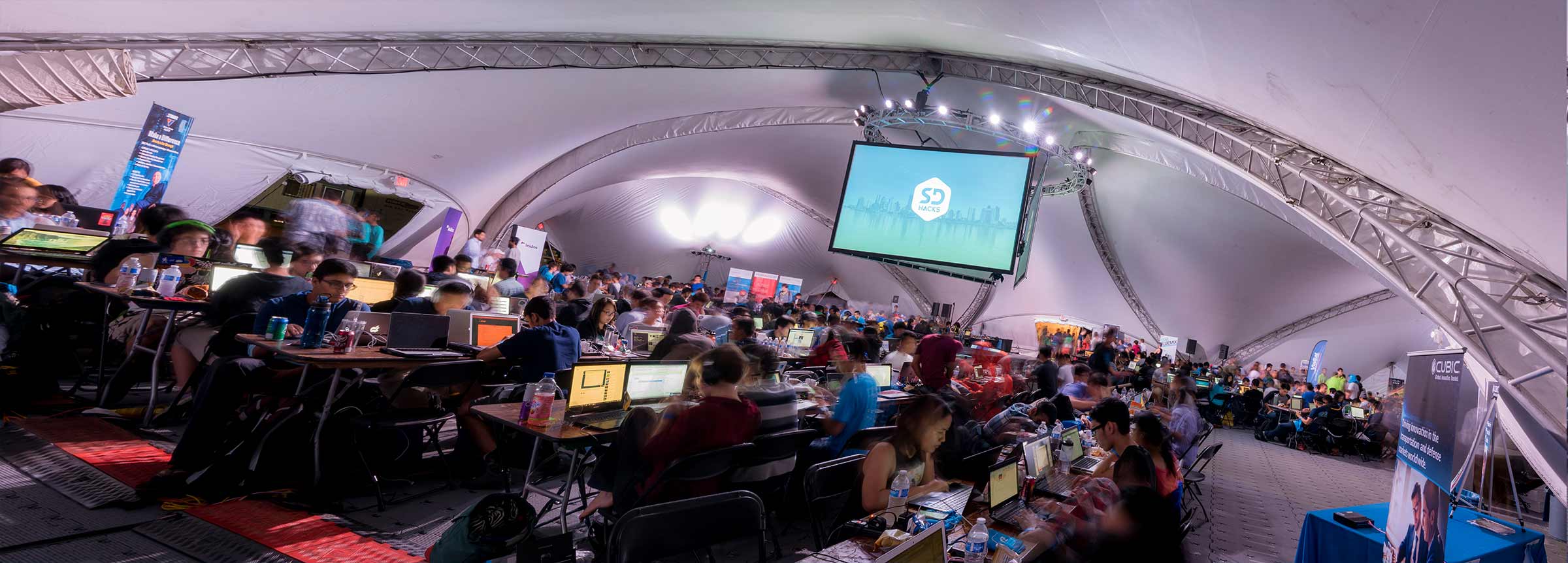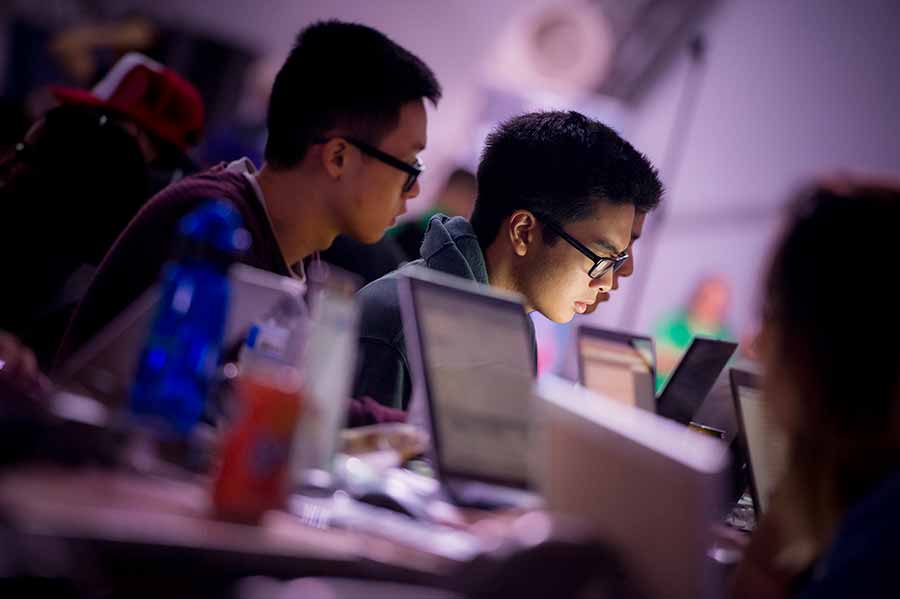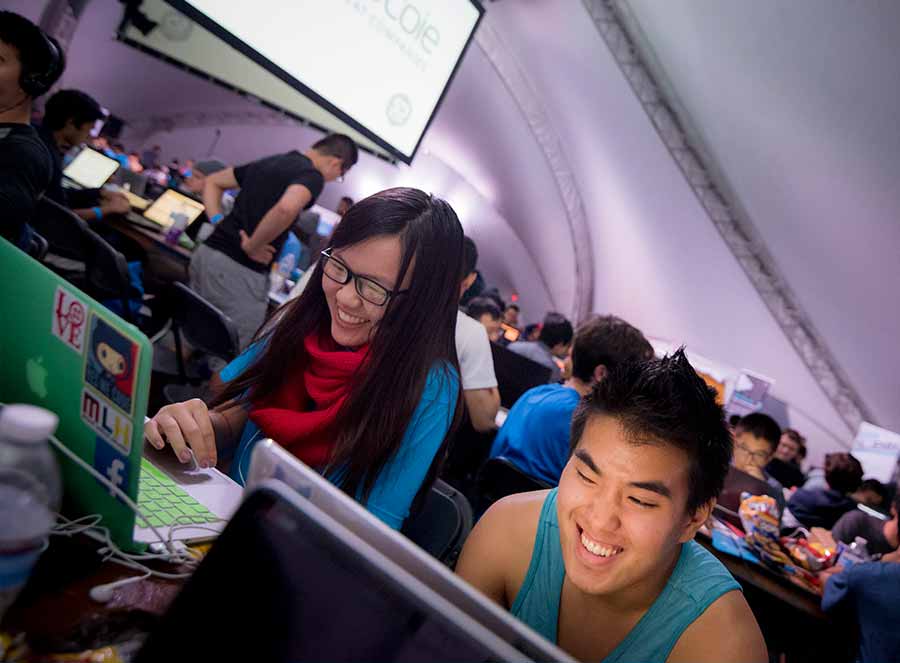
By:
- Deborah Osae-Oppong
Published Date
By:
- Deborah Osae-Oppong
Share This:

Photos by Erik Jepsen/UC San Diego Publications
Round-the-Clock Hackathon Helps Coders Make Connections, Develop ‘Crazy Ideas’
More than 1,000 computer science students gathered in a massive air-conditioned tent at UC San Diego’s Triton Track and Field Stadium Oct. 2-4 for the first-ever SD Hacks competition. The 36-hour round-the-clock hackathon challenged student teams to generate innovative working projects or “hacks” that rely on software, biotechnology, virtual reality, and more.
The event’s Grand Prize went to the team that created a mobile payment system that generates a magnetic field to emulate a credit card signature. The idea is to allow users to make retail purchases without a physical credit card on hand. The winning team, SNS Payments, included Chet Lemon, Kesav Mulakaluri and Christopher Zelazo, all UC San Diego computer science majors.
Undergrads with the UC San Diego Triton Engineering Student Council (TESC) organized SD Hacks with the assistance of the UC San Diego University Events Office, which provided event planning and production support. SD Hacks drew participants from across California and the country.

SD Hacks Director and UC San Diego computer science undergraduate Ryan Hill did much of the heavy lifting required to make the event a success. He encouraged participants to push their boundaries, make a statement, and learn something in the process. “[Employers are] looking for people who are beyond just someone who goes to college and gets a GPA,” he said. “They are looking for innovative problem solvers, people who can think of good ideas and put them into action.”
Darren Hrabovsky, a Qualcomm employee, commented on the impressive array of competitors and the event’s success. “We helped fund it, but it’s really the students who pulled it off,” he said. “I walked in here, and it knocked my socks off.”
UC San Diego alumnus Aaron Liao, who served as a judge and mentor for the event, closed out the night by telling the crowd, “I’m here to encourage you to take huge risks and to fail, to pick yourself up when you fall, dream a little bigger, chase those dreams until you conquer them. If you’re going to do something, go big or go home.”
A Massive Undertaking
The event was held in a huge temporary arena with free on-site wifi, 3D printers, and “hacked” outdoor plumbing. Representatives from sponsor organizations networked with students throughout the event.
UC San Diego students Eric Chen and Vaibhav Shah remarked that they were proud to have represented UC San Diego at such a high-profile event.
“It’s great for the school — it gives it a public face. Having a hackathon here is a big step up for the computer science department, and growing UC San Diego’s reputation will definitely be helpful as we start to look for jobs.” Shah said.
Chen added that while it was a fantastic learning experience, the connections the coders could make would be invaluable. “We get to meet recruiters, meet companies, and meet new people. It’s a great opportunity to learn from others and network for the future.”
Among the keynote speakers to address the crowd at kickoff was San Diego Regional Economic Development Corporation Board member Peter Townshend, also a partner in the San Diego legal firm Perkins Coie. “UC San Diego has one of the best computer science departments, and it’s long-time overdue to have a hackathon and get visibility from the local tech community,” Townshend said.
George Beall, CEO of Touch Tiles LLC interacted with students during the hacking hours. He emphasized the importance of entrepreneurs, and stressed that hackathons are a valuable chance to develop “crazy ideas” for the sake of development, with creativity unfettered by looming paychecks or grades.

A representative from the online shopping startup, Slice, added: “I take a look at all you students here and I’m reminded of why working in technology just energizes me every single morning. The most amazing thing that comes out of hackathons is that ... you invent something new that has the potential to inspire people all around the world.”
Ryan Hill, the student organizer of the event, praised the close-knit hackathon community and commended the tremendous effort put in by his volunteer team. In the coming years, Hill and the rest of the TESC committee hope to expand the event even further, possibly to fit the San Diego Convention Center.
Alongside the coding competition itself, the event featured outdoor zip-lining and various workshops in areas such as data analysis and game development. From its smooth logistics to the innovative ideas on display, SD Hacks 2015 turned out as well as its organizers had envisioned. For TESC and the UC San Diego computer science community, the only question is whether the 2016 event can go even further.
Sampler of UC San Diego “Hacks”
By the end of the weekend, several UC San Diego teams had captured the interest of the judges:
- Electrical engineering senior Kyle Somers and interdisciplinary and computing arts junior Siddharth Atre were awarded the Most Disruptive Hack prize from Qualcomm for their Social Kitchen application, which enables real-time ordering of home-cooked meals.
- Tunemap, an interactive graph that helps users visualize their music and generate playlists, was a collaboration between UC Berkeley and UC San Diego students that made it to the Top 5.
- A third UC San Diego team developed an attention-capturing video game.
SDHacks was sponsored in part by the generous support of Qualcomm Incorporated, the UC San Diego Computer Science and Engineering Department, the UC San Diego Jacobs School of Engineering, ViaSat, Perkins Coie, Cubic Corporation, iBoss Cybersecurity, Drakontas Consulting, Space and Naval Warfare Systems Center Pacific (SSC Pacific), leidos, ESET namecheap, Microsoft, IBM, Touch Tiles, Facebook, Slice, the Cyber Center of Excellence and Praxis.
Share This:
You May Also Like
Stay in the Know
Keep up with all the latest from UC San Diego. Subscribe to the newsletter today.


